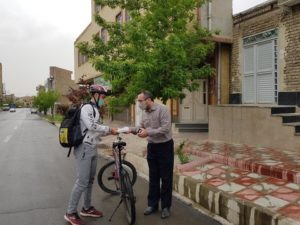Iran Libraries Book Courier Service: A Front Door Book Delivery Service
25 أبريل 2024
With the outbreak of Coronavirus (COVID-19), restrictions have been imposed on the operation of public libraries in Iran, although other new forms of service have emerged. One of these services is the “Front Door Book Delivery”, which is also called “Book Courier” service and delivers physical books to library users. A limited number of librarians first implemented the service voluntarily in the summer of 2020 as a pilot. After this short successful experience, in the fall of the same year, the programme began at the public libraries all over the country.

To date, according to available figures and data, more than 750 libraries have participated in the implementation of this programme. This programme has been launched under different titles, some of which are influenced by traditional Iranian customs. For example, in the province of Gilan in northern Iran, the name “Ketab Dukhan” is given to this project, which in Gilaki (the local language of this region) means, “calling to request a book”. In Khuzestan province, located in the south of Iran, this project is registered under the title “IMAK”, which is an abbreviation of the phrase “Sending the kind friend book” in Persian.
To implement this service, various methods were adopted by libraries. Members can search the resources they like using the national OPAC and then order the book they want through the library’s social network page, website, or by texting and calling the librarian. The librarian then sends the ordered books to the members by mail, motorcycle, and car (personal or library-owned). Hygiene protocols are followed to prevent the transmission of the Coronavirus when packing and sending books.

Although the activities in the public libraries will gradually return to normal with the completion of the vaccination of librarians, this delivery service, and some of the other new practices that have been started in the libraries during the pandemic (especially information projects, virtual reference services, online storytelling etc.), will not only continue but efforts will be made to identify and address the shortcomings of this project to achieve greater effectiveness in implementation across all the public libraries in the country. These efforts will be enhanced through the feedback and reviews of librarians, users and service providers.